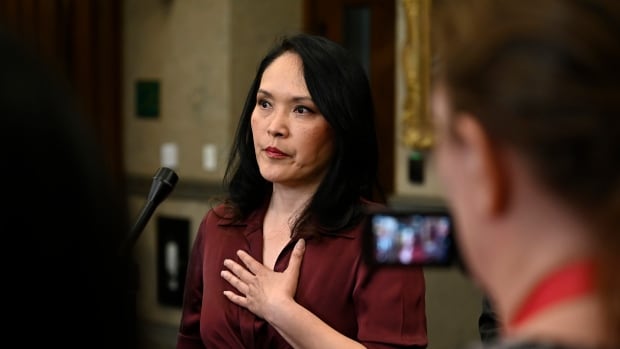Lawmakers will not prioritise a debate on how to make public the names of politicians implicated in the foreign interference report published earlier this year.
Speaker Greg Fergus ruled Monday that a parliamentary privilege issue raised by NDP MP Jenny Kwan in June did not rise to the level of a “prima facie” breach of parliamentary privilege that should take precedence over all other business in the House of Commons.
In June, Kwan suggested that a report by the National Security Intelligence Committee of Parliamentarians (NSICOP) had tarnished the reputations of all sitting members of parliament.
The report, based on intelligence reports, alleges that some members of parliament have “semi-knowingly or knowingly” participated in foreign efforts to interfere in Canadian politics. The unredacted report does not name those members.
Kwan argued that as long as the names of these politicians remain secret, Canadians will lose confidence in their elected representatives and their ability to do their jobs will be undermined.
“No names are mentioned in the report, which leaves all 338 members of the House under a shadow of suspicion, including those who have since left this chamber,” Kwan said in June.
But Judge Fergus ruled on Monday that Kwan had failed to prove “with particularity” that keeping the councillors’ names secret interfered with their ability to perform their duties.
“While I understand that the findings set out in the NSICOP report are significant and may seem to raise doubts about certain members, they are not in themselves a basis to establish that this issue of privilege should be considered above all other business in the House,” he said.
For a prima facie breach of privilege, the issue must be raised in a timely manner, and Justice Fergus noted in his judgment that Kwan raised the issue two weeks after the NSICOP report was published.
“The facts that the member raised in the debate were apparent long before she intervened and the speaker believes the member for Vancouver East had an opportunity previously to raise her concerns,” he said.
Fergus’ ruling does not mean that debate over publishing the names in the NSICOP report cannot continue – just that it will no longer take priority over other matters on the House of Commons’ agenda.
The Conservative Party had put pressure on the government by having government officials reveal the names of MPs named in the report on the floor of the House of Commons, where MPs have certain legal protections.
When asked in the House of Commons about the possibility of their names being released, RCMP Deputy Commissioner Mark Flynn suggested it was a grey area.
“Given the complexities of parliamentary privilege, this is a question that should be asked of legal experts,” Flynn told CBC News in June.
Kwan had called for the matter to be referred to the House of Representatives Procedure Committee to explore how the names from the report could be made public without compromising national security.
The issue could come up in committee, where lawmakers would have to agree to an investigation.
Names will not be released in the investigation
Judge Fergus’ ruling came two weeks into the second phase of the public inquiry into foreign interference.
Judge Marie-Josée Hogue, who is heading the investigation, said she had reviewed the information on which the NSICOP report was based. She said she was not in a position to release names.
“The allegations contained in the NSICOP report are based on confidential information that cannot be disclosed to the individuals in question, and therefore those individuals will not be in a position to be heard regarding any findings the committee may make against them,” it said in a written statement earlier this month.
“Due to its dual obligation to respect the rules of national security confidentiality and procedural fairness, the Commission cannot make findings that would identify individuals involved in the allegations.”

